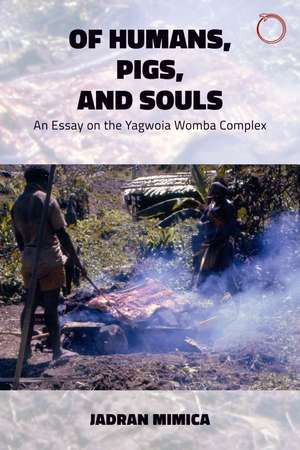Of Humans, Pigs, and Souls: An Essay on the Yagwoia "Womba" Complex: Malinowski Monographs
Autor Jadran Mimicaen Limba Engleză Paperback – 26 feb 2021
Preț: 196.92 lei
Nou
Puncte Express: 295
Preț estimativ în valută:
37.70€ • 39.33$ • 31.60£
37.70€ • 39.33$ • 31.60£
Carte tipărită la comandă
Livrare economică 10-15 martie
Preluare comenzi: 021 569.72.76
Specificații
ISBN-13: 9781912808311
ISBN-10: 1912808315
Pagini: 178
Ilustrații: 1 halftone, 1 figure
Dimensiuni: 127 x 203 x 15 mm
Greutate: 0.2 kg
Ediția:1
Editura: HAU
Colecția HAU
Seria Malinowski Monographs
ISBN-10: 1912808315
Pagini: 178
Ilustrații: 1 halftone, 1 figure
Dimensiuni: 127 x 203 x 15 mm
Greutate: 0.2 kg
Ediția:1
Editura: HAU
Colecția HAU
Seria Malinowski Monographs
Notă biografică
Jadran Mimica is a senior lecturer in anthropology at the University of Sydney. He is the author of Intimations of Infinity: The Cultural Meanings of the Iqwaye Counting and Number Systems and of many contributions to psychoanalytic anthropology and Melanesian ethnography.
Cuprins
Introduction
Chapter 1. The womba condition of the soul
The causes and attributes of womba soul affliction and shamanistic treatment
The case of Qang
The desire for pig-meat
Chapter 2. Men and women as womba
The case of Qwoqwoldate
The case of WoGaye
A specifically female aspect of the womba complex
Womba killing
Chapter 3. Womba self-experience
The case of OMitane
The case of OAp
Chapter 4. The spectrum of Yagwoia cannibalism
An inside perspective
Exo- and endo- modes
Experience of necrophagy
Chapter 5. On ki’nye (sorcery) and the mother’s breast’s malediction
The mirror-circuit of the mother’s breast’s malediction
Sorcery in hindsight
Chapter 6. The womba complex in regional perspective
The non-Angan outsiders
Reverberations of the complex among neighboring Angan groups
A comparative amplification
Ankavi ombi’ and the Yagwoia womba
The womba imaginary and the body: closure and opening
Chapter 7. Concluding reflections: A new wave of Christianization
A Melanesian berit (covenant)
Metamorphosis of the imago Dei and the spirit of the global Evangelion
Chapter 1. The womba condition of the soul
The causes and attributes of womba soul affliction and shamanistic treatment
The case of Qang
The desire for pig-meat
Chapter 2. Men and women as womba
The case of Qwoqwoldate
The case of WoGaye
A specifically female aspect of the womba complex
Womba killing
Chapter 3. Womba self-experience
The case of OMitane
The case of OAp
Chapter 4. The spectrum of Yagwoia cannibalism
An inside perspective
Exo- and endo- modes
Experience of necrophagy
Chapter 5. On ki’nye (sorcery) and the mother’s breast’s malediction
The mirror-circuit of the mother’s breast’s malediction
Sorcery in hindsight
Chapter 6. The womba complex in regional perspective
The non-Angan outsiders
Reverberations of the complex among neighboring Angan groups
A comparative amplification
Ankavi ombi’ and the Yagwoia womba
The womba imaginary and the body: closure and opening
Chapter 7. Concluding reflections: A new wave of Christianization
A Melanesian berit (covenant)
Metamorphosis of the imago Dei and the spirit of the global Evangelion
Recenzii
"Complex spatial and temporal settings define this creative work. . . . Mimica stands out for his linguistic competence and his intense focus on subjectivity. His close reading will likely gain in stature as the region becomes subject to comparative, transformational analysis, a circumstance Mimica’s intense description facilitates. . . . Mimica’s erudition rises on every page."
“For Jadran Mimica, a lecturer at the University of Sydney, womba affliction has its origin in local ideas of kinship, which involve people consuming one another’s bodies and energies to make other bodies and energies. Pork offers a substitute for human flesh, but womba can also be seen in infancy, when the baby is parasitic on its mother in the womb and then at her breast. This ‘appetitive passion’ used to take many forms in Yagwoia culture, including endo and exocannibalism, necrophagy, seminal nurture (institutionalised homosexuality) and the consumption of raw or putrid flesh, both human and pig. Eating and being eaten is what makes the world go round.”
"This book is original in its subject matter and provides rich and detailed analyses of how morality and selfhood are actualized in the Yagwoia lifeworld."
"This book is an embarrassment of riches both ethnographic and theoretical. The depth and scope of Mimica's ambition are rare. His inimitable writing style carries the reader forward headlong, at times breathlessly. His choice and treatment of topics—Christianity, shamanism, mind, personhood, and subjectivity—are very much of the moment. The presentation and analysis of Yagwoia men's dreams demonstrates why psychoanalysis, skilfully deployed, remains indispensable in ethnography, especially the notion that the outsider, self-aware, steeped in knowledge of and sympathy for the other, is often well-equipped to represent the other's subjectivity. Mimica's fine-grained portraits of individual Yagwoia and their milieux, created over many years, add to the authority of his insights into the Yagwoia life-world."
"This is a remarkable text. It is evident that we are in the hands of both a major intellect and a masterful ethnographer. The work is a powerful one."





